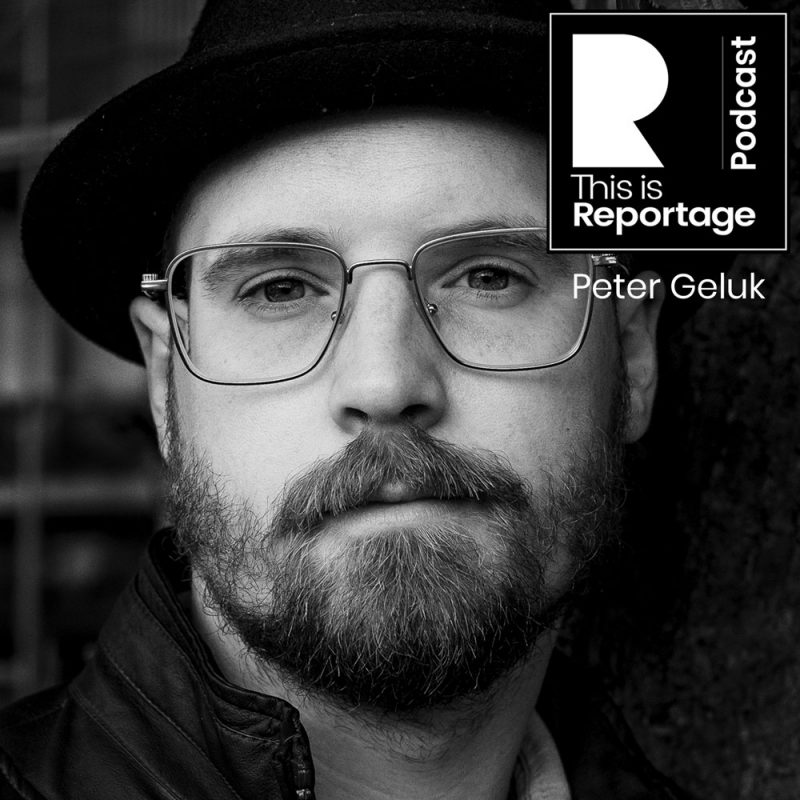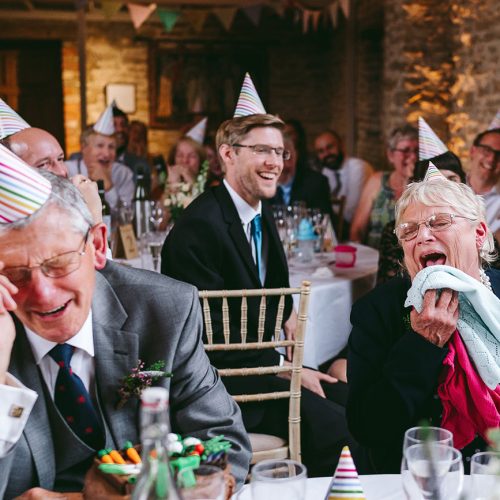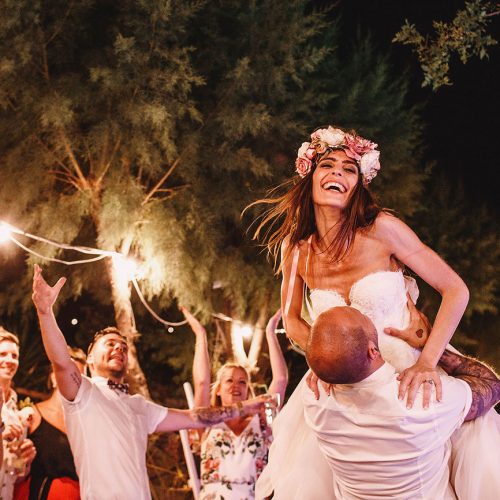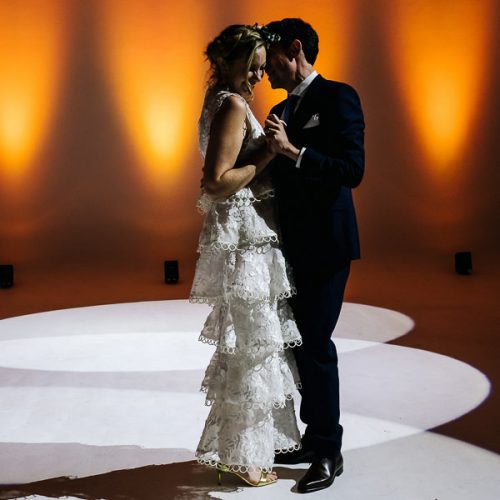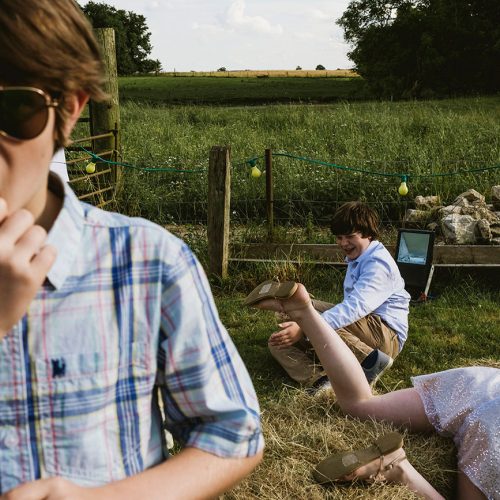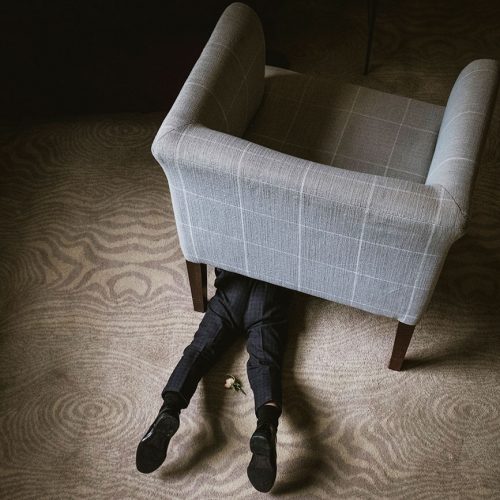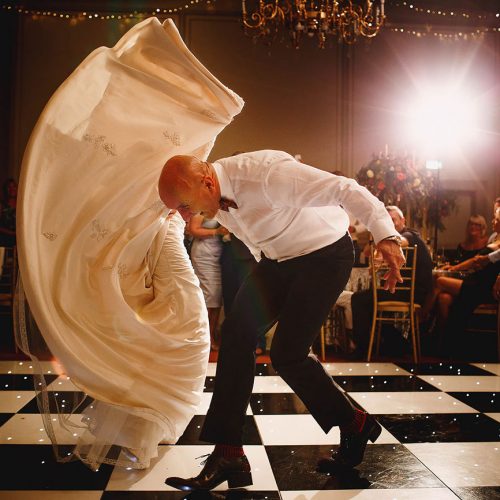Podcast Episode 28: This is Peter Geluk
Delighted to be bringing you the fantastic Peter Geluk for episode 28 of the This is Reportage Podcast! One half of Love Rules, Pete shoots with his wife Mitzy, and they were both in our Top 100 Photographers of 2019 list with a plethora of awards between them – truly some of the best wedding photographers in the Netherlands.
Pete shares so much with us today, including:
- how he’s coping with the pandemic,
- how a certain scary event led him to be in business with his wife,
- the benefits of shooting as a husband and wife team,
- the reason why he’s found himself shooting less frames per wedding,
- a great tip to increase your patience and concentration,
- what he’d do if he won the lottery,
- what ‘being successful’ means to him,
- how being a wedding photographer has had an effect on his character,
- the story behind one of his specific Reportage Awards,
- why its vital to know your clients beforehand,
- his first ever paid wedding,
- his advice if you’re not feeling happy with your work or career point,
- mentoring and feelings of responsibility,
- a massive tip for a piece of software he couldn’t do without,
- having a videographer as part of the team and tips on working with them,
- why they chose to downsize,
- his creativity journey,
- and much more…
You can listen on all our usual channels: Spotify, iTunes, Google Podcasts, YouTube, and below in this post (with a full transcript, too). Check out all our other wedding photography podcast episodes, too.
Alan Law:
Hey Peter. How you doing?
Peter Geluk:
Yeah, I’m fine. Alan, how are you? So nice to talk to you.
Alan Law:
Oh really nice to hear you as well. Really cool. Yeah, I’m fine. Thanks. All good. All good. Well you know, as good as can be expected, I guess at the moment. Yeah. How’s things with you over there? Cause you’re in Holland, aren’t you?
Peter Geluk:
I am in Holland or the Netherlands. Yeah, it’s actually not bad. The beginning of the pandemic was trickier than it is now somehow. So sort of settle into it, I guess.
Alan Law:
Yeah, I guess you do start to kind of almost accept it as a new way of life in a way, which is…
Peter Geluk:
Yeah. So we have two kids so that was a bit more challenging in the beginning than it is now. So we found sort of a rhythm.
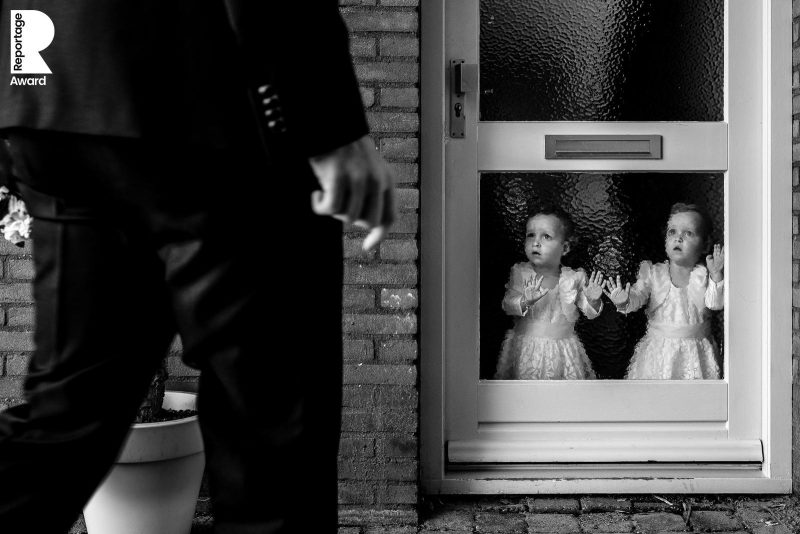
Alan Law:
Right. Okay. Are you home-schooling them?
Peter Geluk:
We are home-schooling, but that ends next week, so.
Alan Law:
Oh really? Oh wow. Yeah. Cause it’s hard, isn’t it? It’s hard, that home-schooling.
Peter Geluk:
It’s really hard. It’s really hard. So much. There’s so much more respect for all the teachers out there. Unbelievable!
Alan Law:
Yeah, definitely. How old are your kids then?
Peter Geluk:
So my kids are four and six. The eldest is six and he’s a, well obviously the eldest is six. A Boy, his name is Mart and a younger one is a girl. She’s four years old, so she just started school.
Alan Law:
Oh okay. And they’re both going back there next week.
Peter Geluk:
They are both going back. They’re sort of doing half and half, so they’re going Mondays and Wednesdays and then the other half of the classes are going the other days or something like that. So…
Alan Law:
Oh Okay. That’s interesting because here in the UK, we don’t know yet what’s going to happen. Apparently on Sunday there’s going to be a big kind of speech by the prime minister to give us that overall roadmap. But at the moment, you know, all schools are off and we just don’t know what’s going to happen. But that’s interesting that you were doing that.
Peter Geluk:
Yeah. The treatment is a little differently here
Alan Law:
And how has it been in general in terms of your postponements and things? How’s that been?
Peter Geluk:
Yeah, well it’s not been too bad, but that’s also because the majority of our weddings was in the second half of the season. So we didn’t have that many in April and May, only a few. Those were postponed obviously.
Alan Law:
Have you been given guidelines about kind of when weddings will be back on and things?
Peter Geluk:
Yeah, we just had that big announcement from the prime minister last Tuesday and they’re now saying from the 1st of September weddings and bigger events can happen up to 100 people. However we have the big one and a half meter rule here. So that’s a rule that everybody keeps that distance.
Alan Law:
Right. Well, even after the 1st of September then for weddings as well.
Peter Geluk:
Yes. So that’s going to be, I mean a lot of couples will still be postponing because who wants to be at a one meter and a half distance and how will that work in reality? I don’t know.
Alan Law:
Oh man. It’s mad isn’t it? You kind of almost have to smile and laugh because otherwise you could just go under really.
Peter Geluk:
I mean, what else? What else can we do? We try to go with the flow and I have to say now the business has sort of taken a back seat to home-schooling and entertaining the kids. I feel like a full time children entertainer now although my wife has taken over most of it so I can actually start doing some work again, which I’m very, very grateful for.
Alan Law:
And you actually, so you shoot with your wife, don’t you?
Peter Geluk:
Yes.
Alan Law:
How did that happen? How did you come to shoot together?
Peter Geluk:
Well, diving into the heart of it. That’s actually an interesting story and then so many things are tied to it. So it started in 2016. And I was doing really, really well just on my own, having fun. I started being a self-employed photographer in 2010.
Alan Law:
Oh Quite a while ago then, almost like a decade.
Peter Geluk:
Yes, it is a decade. I just realized at the beginning of this year.
Alan Law:
Were you doing weddings right from the beginning or?
Peter Geluk:
Yes. The very first paid gig I did was a wedding and it was all very traditional back then, you know, all the beauty shots and whatnot. And so 2015 I started to take the plunge into photo journalism a little bit with weddings. So moments photography. And that really caught on fast with me. Okay, hang on. This is what it’s supposed to be like. This makes sense now. So that was 2015 and then in 2016, something weird happened. So I woke up in the middle of the night on a Thursday night. I had a wedding the day after that. So I woke up in the middle of the night at one o’clock and I was staring in my wife’s face. My tongue hurt. There was blood dripping down my chin and my in-laws were in the bedroom, which was weird. They don’t usually do that.
Alan Law:
No, that is quite weird.
Peter Geluk:
Yes, yes. So apparently I had a, I think it’s called a seizure in English.
Alan Law:
Oh right. Okay. Wow.
Peter Geluk:
And it’s what the epileptics have mostly.
Alan Law:
Right. So scary.
Peter Geluk:
I know. Well, it wasn’t for me, I had no clue what was going on. I was staring into like, what the hell is going on? And like 30 seconds later the ambulance people walked in so I’m like, what the hell is going on? So it turned out I had a seizure. So I ran off to the hospital and you know, as a responsible wedding photographer knowing you have a wedding the next day, first thing you do is post a message online see if anybody’s available to take over that wedding the next day because I was pretty sure I wasn’t going to be able to do that.
Alan Law:
Yeah. Yeah. Terrifying.
Peter Geluk:
That’s crazy. And there were a lot of helpful photographers out here, just a great community here in the Netherlands.
Alan Law:
That’s cool.
Peter Geluk:
So I did get helped out that Friday and the Saturday that I had a wedding also. So anyway long story short I ended up not having epilepsy. Is that how you pronounce it?
Alan Law:
Yeah. Yeah, yeah.
Peter Geluk:
I don’t have that. So there’s this little thing in my brain which is sort of a cluster of veins, really, really tiny veins. And one of them popped and started leaking. So it’s sort of the size of a marble.
Alan Law:
Oh man.
Peter Geluk:
Yes. So it sort of shortcut my brain.
Alan Law:
That must have been terrifying for you and your wife.
Peter Geluk:
Well, my wife mostly because I didn’t have a clue what was going on. I just had a little bit of pain in my tongue, but I completely missed the whole episode and she got everything, so me shaking and well, weird eyes and everything. So she’s been traumatized ever since.
Alan Law:
Right, I bet yeah,
Peter Geluk:
It’s crazy.
Alan Law:
Are you okay then? Are you alright as well?
Peter Geluk:
That’s the weird bit. Right? So I ended up in hospital for a few days and they scan me through an MRI and they found that little marble vein thingy, which is quite common, but mine popped, which is not that common. So they started monitoring me and looking at, okay, is it growing? It’s not growing. What are the possibilities of it starting to leak again? Not that big. So we’ll just leave it there. They left that choice with me, but that’s what we’re doing. So I’m okay. I get check-ups every year and there’s not that much going on actually. But here comes the part where my wife Mitzy gets into the picture because I still had a lot of weddings to do that year and the rule here is if you’ve had one of these seizures, you’re not allowed to drive.
Alan Law:
Oh Okay. Yeah.
Peter Geluk:
Security and insurance reasons for six months. So I really needed just a driver for the weddings I needed to go to. So I got some students here and there and some friends, but most of them, my wife joined me.
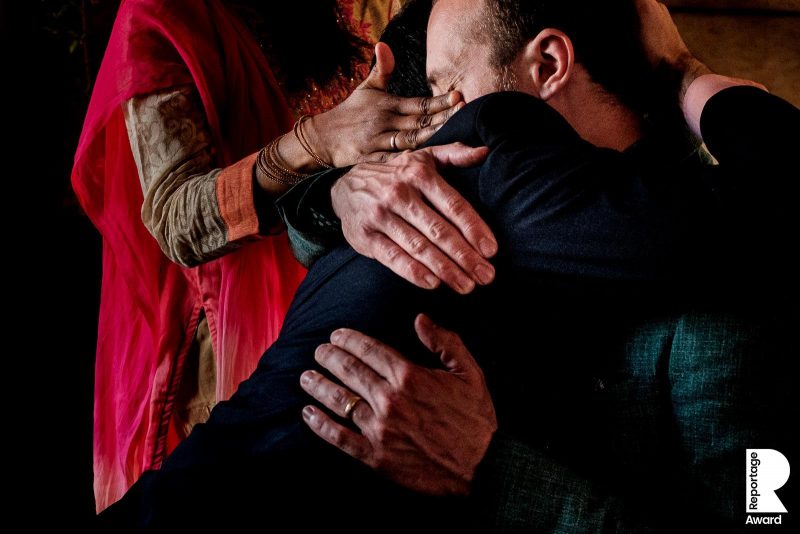
Alan Law:
Right. Had she done any kind of photography before?
Peter Geluk:
Nothing, but I mean absolutely nothing. And I said, look, here’s a backup camera. I mean, she was bored obviously. There wasn’t that much driving going on all day. So I said, look, here’s a camera. Just shoot stuff. Just shoot at stuff for like. Shoot me then I can use it for backstage, for social media or whatever. Just go and here’s the thing, right? So the first wedding I came home, I started downloading my pictures and then I said, okay, give me your card. And I started downloading those. And then that’s when the surprise happened. Because remember what I said, in 2015 I started to get into the photojournalism of things? Apparently she had a knack for that, I mean.
Alan Law:
Oh really, straight away.
Peter Geluk:
Right away. And you know, technically there was obviously much to do about it, but she knew those moments. She anticipated them really, really well. So she felt it. Yes, she had that. So we decided for all the weddings after that, we decided to work on that and give her sort of a training, sort of a crash course. And yeah, that’s what happened man.
Alan Law:
Oh that’s Cool. And how long was it before you were kind of both full time. Are you both full time together then now?
Peter Geluk:
Yes, we are both full time. Obviously now things are a little wobbly, but
Alan Law:
Yeah. Yeah. But from apart from the pandemic but yeah. How long did it go from that first wedding where she kind of shot with you until you were kind of both fully time working together?
Peter Geluk:
Six months.
Alan Law:
Wow, that was quick then. That’s cool.
Peter Geluk:
We can be a bit impulsive sometimes.
Alan Law:
I think that can be a really good thing in life because otherwise you can just not get things done if you think about it too much.
Peter Geluk:
Exactly. And that’s actually how I started being self-employed as well. Because I had a job and I got burned out. I was doing photography and I was coming out of the burnout and my boss said, okay, look man, I love you. You can stay here, you can do whatever you want. Just pick any job in the company. You can do it, whatever, however you have to make a decision. It’s either this or photography because if you stay here, I want you 100%. So right then and there I decided, okay, thanks for the offer. I’m going with photography, which was also a bit of a hard conversation when I got home.
Alan Law:
Yeah.
Peter Geluk:
But she understood.
Alan Law:
That’s cool. Oh, that’s so good to have a supportive partner like that. And now how do you find it now then kind of working as a husband and wife team? Do you ever argue, ever disagree about things or is it like a perfect union on the day?
Peter Geluk:
Neither. It’s in between. It’s a grey area as always, isn’t it? Yeah, I know we do argue about many things but we share the same vision. We share the same vision about life, we share the same vision about photography and we share the same vision about what a wedding should be and what it should look like. And sometimes I surprise her with something and vice versa. You know, she surprises me. It’s like did you take that photo, are you sure? Yeah. Yeah. And then it surprises me, you know, and that goes both ways. And then you sort of build on that together.
Alan Law:
That’s cool. That’s cool. I mean, I love my wife dearly and she will be listening to this afterwards as well. I don’t know how, I can’t imagine working with her at a wedding. I think it’s a great skill that you two can do that.
Peter Geluk:
It’s not for everybody. It’s not for everybody, but yeah, we pull it off and we had worked together in the past so we knew we were going to be able to do that. So yeah.
Alan Law:
Oh, that’s cool. And do you have like certain roles that you stick to on a day? Like does one of you do bride prep, and the other does groom prep or you kind of both do both things? How do you do it?
Peter Geluk:
We do both things. We swap. So one time I’ll do the bride, next time she does the bride and that’s something we talk to our couples about obviously, because every now and again you do get a bride who says, okay, I really want a woman there to be with me. Although the type of clients we get are, yeah, usually that relaxed they say, I don’t care. Just whoever, just I trust you both.
Alan Law:
That’s cool. And I guess the clients must love the fact really that you’re a husband and wife team. I think that must add, you know, a certain degree of, I don’t know, just overall kind of like warmth and empathy, maybe, knowing that that their wedding is going to be captured by a couple that are in love themselves. I don’t know. Do you talk about that on the client meetings and things?
Peter Geluk:
We do and it’s something we didn’t anticipate beforehand. So when we started doing this obviously at some point we started doing the client conversations together. And yeah, at some point somebody must’ve said it’s so cool that you guys are doing this together. We’re so happy and that you guys are coming to our wedding. And then it took a while, but then we realized, hang on, for us it’s a natural thing, right? It comes natural. This is just, yeah, at some point we decided to let, yeah, let’s do this together because we enjoy doing it. And then to other people it looks completely different. It looks like this is so cool. You know, you guys shared a lot and then you shared a love of photographing a wedding also. How cool is that? So yeah, we do talk about that. Yeah.
Alan Law:
Oh, that’s cool. That’s very cool. And do you, you know, do you find… I’m only ever really a solo shooter and I have so many photos myself that I take. With the two of you, how many photos do you take? Have you found that you’re taking more and more or are you shooting less as the years have gone on?
Peter Geluk:
I’m shooting less. Mitzy’s sort of steady. I call her Mitz sometimes. She’s called Mitzy, but I call her Mitz. Everybody also calls me Pete. Nobody ever calls me Peter.
Alan Law:
Oh Okay, cool. Sorry.
Peter Geluk:
For future reference. Like everybody who knows me longer than five seconds calls me Pete. Anyway, yeah, she’s sort of steady, I think like, let’s say a 12 hour wedding, we end up with about 8,000 to 9,000 photos together, so.
Alan Law:
Right. Okay. That’s quite a lot. But manageable, I guess.
Peter Geluk:
It’s manageable.
Alan Law:
But you mentioned how you started shooting less and is there a specific reason for that?
Peter Geluk:
Yes, there is a specific reason and he has a name. His name is Tyler Wirken.
Alan Law:
Oh, cool. Oh cool. I just spoke to Tyler.
Peter Geluk:
I still have to listen to it, but yeah, I saw that. Yeah, I know and not because he told me to. Just because he started pushing me and I started pushing myself to less start shoot at things as he calls it, and actually shoot what’s happening. That’s been a big thing for me and that for me, that boils down to shooting less, not just running around and frantically clicking.
Alan Law:
Yeah, I get that. So it’s a general kind of overall kind of slowing down and more patience. I think for me that’s been a big effect on my kind of documentary, it’s definitely patience, but it’s hard isn’t it? A lot of the time when you hear that huge laugh and you feel like you’ve got to run away and capture that, but I guess part of it is having confidence in yourself that something… that you appreciate might be happening in front of you and sticking with it.
Peter Geluk:
Yeah, exactly. And I often say photography is about making decisions, the whole day. You’re making bigger and smaller decisions about, okay, do I do this? Do I stay here? Do I go there? You have to make a choice. Choices, choices, choices, the whole day. That’s what you do. And I’ve learned by practice and by patience, which is not my strongest, that’s not the strongest part of my character. But I’ve learned to be more patient as a person by doing that. And also what I’ve done is this is a top tip for anybody who wants to practice this. I wasn’t sure if I was going to give this away, but I am going to because I did some family sessions just to practice this and all I took was one camera, one lens, and one two gigabyte card, which took about 40 photos and then I shot for about four hours with the family. So I had to be really, really, really careful about what I shot. And I wasn’t allowed to delete anything. So you have to be strict on yourself, otherwise this doesn’t work.
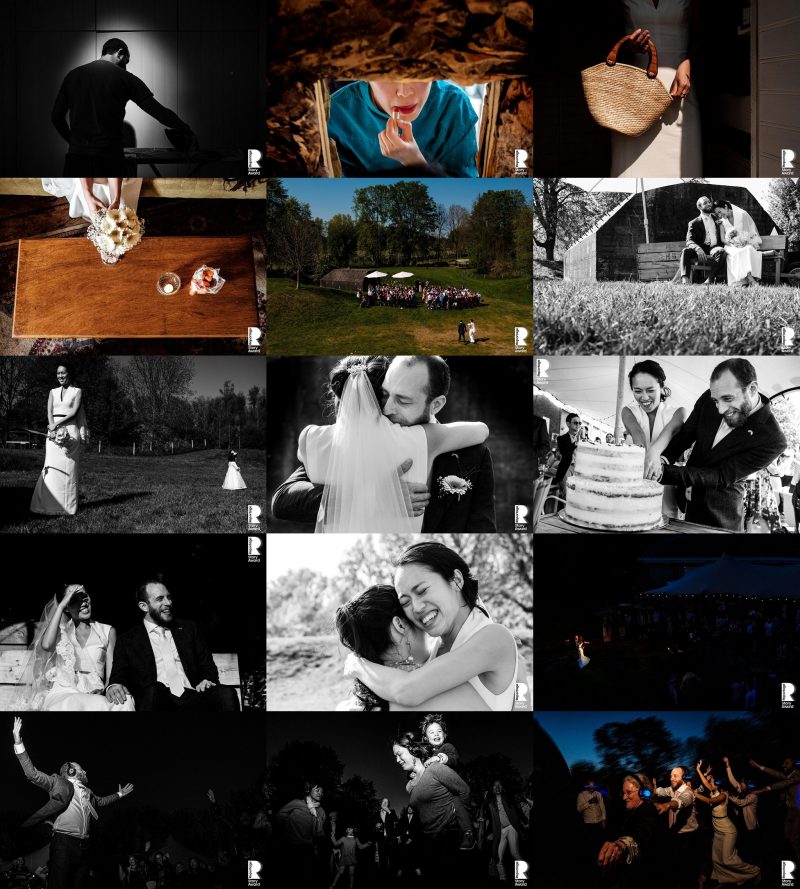
Alan Law:
That is cool. That is a really good idea.
Peter Geluk:
I know, I know. It worked like a charm, so by the time I was doing the third one, things were going crazy fast because that’s the learning curve. That’s crazy. It works really well.
Alan Law:
That is cool. Right? Okay. And your next wedding, you can only take a hundred frames.
Peter Geluk:
Exactly. No, I wouldn’t do that because I know with weddings there’s always the pressure right? So you have to kind of give yourself some space. So yeah.
Alan Law:
But the idea, I think that’s a really good idea challenging yourself like that. And that makes a really good idea. I’m gonna do it. I get it.
Peter Geluk:
Let me know how it works. And I like simplifying this stuff. You know? I like working with one or two lenses. So I like simplifying my choices because I don’t like choices. I’m the person that gets flustered in the, in the supermarket aisle with 1400 different types of gel or deodorants, you know, just give me two.
Alan Law:
Oh, I totally agree with you there though. I think so, you know, keep it simple, stupid. I totally agree with that. And I shoot with just the two lenses the whole day, you know, 25 mm, 85 mm and then I’m not having to… my brain is not in overdrive thinking oh what’s going to be the best kind of lighting setup or best lens here. I just know what works for me. And then it’s like, yeah, you can concentrate on the moments and the composition that way.
Peter Geluk:
That’s exactly what it is. So it helps me. So same thing with the two gigabyte card. It’s really hard, but yeah, it did work getting my brain into that place, you know?
Alan Law:
Yeah. No, that’s cool. Great idea. It’d be cool if anyone who’s listening wants to try that out and let us know how you get on, because I think that’s really cool.
Peter Geluk:
Yeah.
Alan Law:
Let’s change tack slightly then Pete. If you won the lottery, what would you spend it on? Or would you still do wedding photography?
Peter Geluk:
Oh.
Alan Law:
Do you enter the lottery? They must have one in Holland.
Peter Geluk:
I don’t. Actually well I do once a year, we do once a year, New Year’s. But it’s tradition thing. That’s the only one we enter. I really am a big believer in creating your own luck, you know, but still, you know, it’s nice to have the dream once a year. So what would I do? I guess I would still be doing wedding photography. So here’s the thing, right? So I’ve been in love with photo journalism ever since I encountered it and Tyler is also the one who really ignited that flame in me, the way he does it, the way he set up his rules. You know, the photo journalism ethics. I really have to thank him for them, and I like that because it limits my choices and again, simplifies things for me. It simplifies the choices, not the results.
Alan Law:
Yeah. Yeah.
Peter Geluk:
I think I will still do wedding photography, but I would definitely, definitely travel more because I’m 38 now.
Alan Law:
That’s still young. That’s young man.
Peter Geluk:
I know. Hang on. I’m young. There’s still the possibility, but I wish I travelled more in my early twenties, you know?
Alan Law:
Right. Before you had kids.
Peter Geluk:
Yes, exactly. So I didn’t, we didn’t, so that’s something we, we’d like to do with the kids as well, and I’m trying to find a way to fit that into our lives.
Alan Law:
You might have to wait awhile until international travel is lifted.
Peter Geluk:
Well, yeah, that’s going to be problematic now, isn’t it? Yeah, no, but so winning the lottery would probably give us the opportunity to do that more travel because I think the travels I’ve done so far have always made me a better person, a richer person and have given me great photo opportunities as well.
Alan Law:
That’s always good, isn’t it? Yeah.
Peter Geluk:
Yeah. I love it.
Alan Law:
Do you like traveling for weddings?
Peter Geluk:
I do actually and I don’t get to do it enough. I’m always jealous of the photographers who show off all these great destination weddings. And I’d love to do more of those. I’ve done a few, Mitz and I together have done one in France and I’ve done one in Italy, in Tuscany.
Alan Law:
Oh cool, that’s nice.
Peter Geluk:
Yes. Well, it was really nice actually, and I really enjoyed it, but yeah, I’d love if there were more of them, although from a practical point of view, I don’t think we can do like more than two or three every year because we’ll get very unpractical with the kids.
Alan Law:
Yeah. It just changes, doesn’t it? When you have kids? I’m kind of jealous of those young, early 20 something photographers who can target destinations all the time. But yeah. What does it mean to be successful to you?
Peter Geluk:
That’s a very good question actually, because that’s the sort of thing that changes over time, doesn’t it? Yeah. So to me, it used to mean being on top of your game and winning all the awards and being well known in the photography world which is a really small world. There’s an emourmous world besides that, and outside of that, which is equally interesting or even more and that’s something I discovered the past, let’s say, two years, that became more interesting to me and coincidentally that’s the time when I started winning the awards because probably I let go of that notion and I just let things be.
Alan Law:
Oh okay. And that’s ironic, isn’t it, in that way?
Peter Geluk:
Well, you know, it is ironic. And also it’s I mean, is it success? I don’t know. I mean, that’s a philosophical question, isn’t it?
Alan Law:
Exactly. That is a thing. And that’s why I find this question so interesting.
Peter Geluk:
I know. Because besides a photographer, I’m also an entrepreneur, right? So in the end, I look at the numbers and if the numbers aren’t great, something’s not going well. I could be the best photographer in the world for winning awards or getting credits or prizes or whatever. If I’m not selling, what’s the point? I mean, I should be selling weddings and shoots. So it’s a combination of these both things, right, that defines success for me. And I’m always struggling to find a balance between them. So always the artist and the entrepreneur that are fighting. So sometimes one takes over and sometimes the other.
Alan Law:
Yeah, totally get that. And do you and Mitzy have a kind of similar outlook on that and what success is?
Peter Geluk:
Yeah, we do actually. And that’s probably why well, why we’re such a good match in life and also in photography because, well, and I think Mitzy even more, I mean, being completely honest, I think I was more hung up and maybe still am a little bit on recognition. Getting the recognition, she isn’t that much. Well, she’s the most honest and I’m trying to think of the English word.
Alan Law:
Man, your English is so good. I wish I could speak the language like you can speak English. It’s amazing.
Peter Geluk:
I’m sorry man. Yeah, well I’ve worked with English people a lot. I’ve lived in Spain for a couple of years and there worked with just English people. So, and I have a knack for languages, so I mean, yeah, I love that. I didn’t love it in high school because you were supposed to be good at math and I wasn’t.
Alan Law:
Oh Okay. And have you come over to England much?
Peter Geluk:
Not that much, actually. I’ve visited London and that’s it. I visited London like four times, I think. And that’s it. Yeah. No, I should have been
Alan Law:
You’ve got to come down to Cornwall. I live in the very Southwest of England.
Peter Geluk:
I’d love to visit man. I mean, yeah, I think that’s one of the most beautiful parts of England, right?
Alan Law:
It is. I’m biased, but it is, you know, it’s right by the beaches.
Peter Geluk:
I know. That’s like the surfing area, isn’t it?
Alan Law:
Yeah, although I’ve never surfed, you know, I live here and I’ve never surfed.
Peter Geluk:
Ah, but that’s okay man. Look, I live in the Netherlands. I’m not hung up on smoking marijuana because I never do. Everybody’s surprised about that, but I’m not. I can’t change that.
Alan Law:
I’ve never been to Holland. I really want to go. I’ve never been.
Peter Geluk:
You haven’t been?
Alan Law:
No, I know. It’s bad, isn’t it? I do really want to go.
Peter Geluk:
At least Amsterdam, you should.
Alan Law:
Yeah, I’ve got to. I’ve got to. Do you think since becoming a wedding photographer that it’s had an effect on your character at all?
Peter Geluk:
It did actually. And even a photographer in general, but especially when photographer, because… and it took me awhile to figure this out, right? So photography is a social, you have to be quite sociable as a photographer, and I’ve only learned that after doing a few weddings that people look at you for certain decisions, especially in the beginning when I was doing the traditional weddings. And I couldn’t get people to loosen up, so I had to change something about my input on that. So from being a quiet, introverted, shy boy, I turned into a very extroverted man.
Alan Law:
Oh Okay. That’s really interesting.
Peter Geluk:
Yes. And that’s what photography has done for me. And wedding photography for the main part. But I’ve also been doing a lot of commercial photography and that has also really shaped my character in dealing with other people and you know, if you have to shoot some hot shot of a big company, you got to be up against this character, right? These are the macho boys so you have to be able to still steer him in a direction you want to. And that takes a little bit of skill and it took some time to learn that and I, you know, in turn use that in weddings also. So I used to be very introverted and that’s completely changed. I’m not an extroverted person now. I’m apparently what’s called an extroverted introvert.
Alan Law:
Oh Okay. Right. Yeah, I see those personality test type things.
Peter Geluk:
Yeah. So I can be extroverted in a group at some point. So I’ll be the light of the party and talk to everybody and have fun and at some point something just snap and I’ll have to go back into my cave for a little bit. But that’s what photography has given me. That’s completely changed my character, has completely changed it.
Alan Law:
That’s cool though, isn’t it? And that’s kind of nice. It’s interesting as well, I guess Mitzy must have seen a change in you. When she started doing weddings as well though, did you see a change in her character?
Peter Geluk:
I don’t think so. She’s been very steady. She’s a very steady person. She’s awesome. I mean the way she’s picked up this and her learning curve was crazy, man. I mean, you could look back at when the first, This is Reportage awards she started winning that was really short after she started photographing and other awards as well. So her learning curve has been amazing and I think that’s down to her being so steady and knowing what’s real.
Alan Law:
Right. Okay. Yeah, no, that’s cool. That’s cool. And so you mentioned an award there. You wrote a, ‘this is how’ piece for us about one of your specific Reportage Awards which obviously people listening, they can’t see it, but it’s if they go to the site, thisisreportage.com, there’ll be a full transcript of this and I’ll put the image in there as well so you’ll be able to see it. It’s a really kind of strikingly emotional capture of a hope between, I think it’s between the groom and his grandma (below).
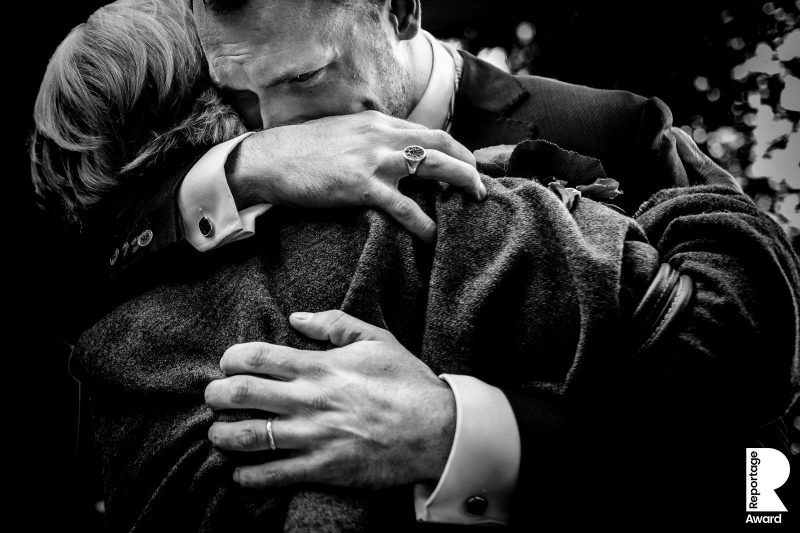
Peter Geluk:
It is, and yeah… go ahead.
Alan Law:
I was just going to say and in the piece you mentioned how you knew to watch out for that moment between them because you knew their particular backstory. So I just wondered if you could expand on that for our listeners. You know, do you think it really helps your photography on the day to know your clients well beforehand?
Peter Geluk:
Yeah, that’s pretty much everything, right? So on the day it comes down to, you know, your knowledge of your gear and everything and your craft. That’s all that should be muscle memory. And then it comes down to seeing or feeling the moments and before all of that. So before that happens, it’s preparation, preparation, preparation, preparation. Because there’s a lot of things you can be aware of beforehand. So we talk to our couples extensively beforehand. So we do two meetings, we do the meeting where we, where we just say, hi, this is us and would you like to book us? And then hopefully they do. And then there’s a second meeting, quite short before the wedding, as short as possible, like two weeks or something. Not much further because then it stays fresh. And we really grill them. We want to know everything. We want to know who’s who, what’s what, where are you going? How does the room look like? What’s your mom going to react like? What’s the backstory of that? Where are you gonna… Everything, everything, everything. We write all of that down. And then we go over it again, usually the night before the wedding. So this is what we did with this wedding as well. So there was a backstory to this groom as well. So they were getting married on the estate of his grandfather who wasn’t alive anymore. He just died a couple of months before the wedding. So actually in the middle of planning the wedding, the grandfather where they were supposed to have the wedding, died. Terribly sad. And of course we knew this. So you’re always, at that point, you’re always looking for the moment between the groom and the grandmother because you know, it’s going to happen sooner or later. And this was actually the first time they came really close because it was right after the ceremony. So they hadn’t had time to be together before that, so I knew they were going to be close and hold each other for a while. And they did. And I didn’t know it was going to be this gripping, but it was, yeah.
Alan Law:
And it’s such a cool capture, honestly. It’s really striking, it’s brilliant and such a deserved award winner. And it’s just so interesting to hear, you know, you possibly wouldn’t have got that shot if you hadn’t have known the backstory and to kind of, you know, be ready for that then really.
Peter Geluk:
No, exactly. And this goes back to making decisions, right? So usually what we do, if people start hugging each other we try to get the face of the one that’s hugging the groom or the bride. I mean the groom and the bride are usually in pictures a lot. So this time I want to see who is hugging him or her. And I knew for this one I didn’t want to do that. So I purposely turned around to get the face of the groom. I wanted to see his face, how he would react to this because I knew he was very close to his grandfather. So this was something that had to do with preparation and knowing I have to go there if I want to have the capture I would like to have, and this doesn’t always work, but this time it did really well.
Alan Law:
Yeah. And it’s great and it’s a brilliant image and anyone listening to this, do come to the site and check it out. It’s fab. Cool. Let’s go back a bit in time then. Can you take us back to your very first paid wedding? I guess you must remember how you were feeling. How did you get your very first wedding and yeah. How did it go on the day itself?
Peter Geluk:
Well, it’s sort of linked to the first wedding I did, which was of a cousin and I did that one for free. They were really young, didn’t have any money. I was photographing. I haven’t done any weddings, but they said do you want to do our wedding? And I did. It was great. I love it. And I think it was friends of them. I’m not really sure. It’s 10 years ago, but I think it was friends of them and they approached me, would you like to do our wedding also? And I said, sure, I’m just building a website actually, so can be one week and then the website will be ready, which it wasn’t obviously, but I had a had a page on there which had pricing so good. Yeah. And I was it was a different experience right from the first one because the first one I was sort of completely free and I had all these ideas and they were happy to go along with it. And now it was a paid gig, so and I felt different. Right?
Alan Law:
Yeah. Were you scared? Were you nervous?
Peter Geluk:
I wasn’t scared. I’ve never been the kind of person that gets scared before, before these big kind of things. I’m not the type of guy who lies awake or worries about card failures or, no, I just don’t, but I was nervous, so I was just nervous for, you know, stuff happening. I wasn’t that well prepared as I am now. I hadn’t talked that extensively to the couple. So it was sort of I had a semi schedule of the day. What was going to happen when and yeah, we’ll see how it goes. So yeah, at some point that the day was, Oh, hang on, I’m not really sure what’s going to happen. Where are we going to go? And I know in an hour from now the reception is going to start, but what’s going to happen in between? I have no clue. So what should I do? So that really got me nervous beforehand. But yeah, only on the morning itself. No, hang on. I haven’t thought this through. So yeah, that’s something I worked on for the wedding after that to improve that. Something to learn, which is what is called learning on the job, right?
Alan Law:
Yeah that’s true.
Peter Geluk:
That’s fits me very well actually.
Alan Law:
Overall though, did it go well?
Peter Geluk:
It actually did go well and they were really happy and like I said, there was all the traditional stuff by then. So three hour photo shoots, all the beauty things, wide open, man. It’s terrible. Wide open landscapes and cars driving on the beach and Oh man. And getting stuck obviously. Yeah. But it was great. I had fun. Right. So that was the point of it.
Alan Law:
That’s cool. Yeah, exactly. Definitely. Yeah. That’s cool. Yeah. And so obviously you were happy and just went from, how did you then get your kind of first kind of batches of weddings? Was it a specific marketing route you went? How did you get those?
Peter Geluk:
Yeah, I was talking to somebody else about this recently and I figured I can’t really remember. I think I was using some social media back then already. So Facebook.
Alan Law:
Facebook pioneer.
Peter Geluk:
Yeah. Yeah. Sort of. Yeah. But I don’t think most of the, I think SEO was a lot simpler then. Well, I think SEO was a lot simpler four years ago so let alone 10 years ago. So I did get found quite a bit also from, so from the one wedding I got another, from that wedding, I got two others, I think. So that was four in the first year because I did 11 weddings in the first year.
Alan Law:
Okay, cool. That’s good going.
Peter Geluk:
I know, yeah. I was really happy. I was really happy. It didn’t grow as fast the year after that, sadly. But it did grow. There were a lot of weddings that came from, you know, people finding me on Google.
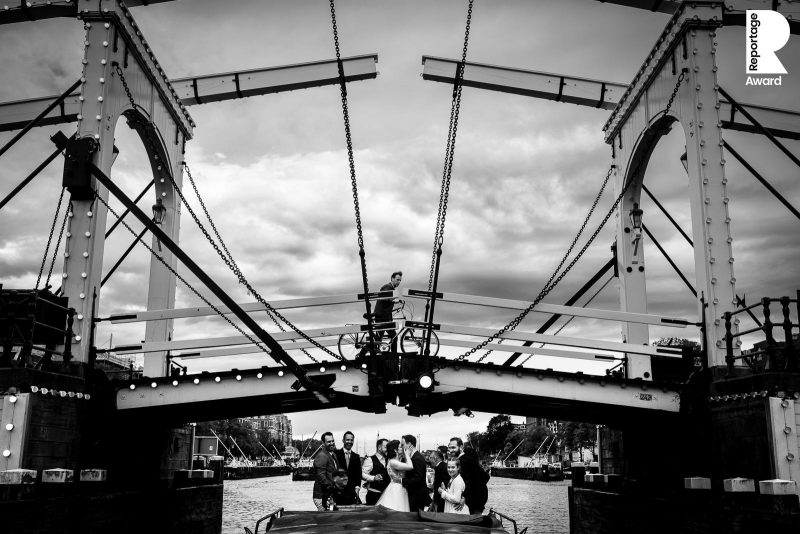
Alan Law:
Well that’s great. I mean SEO is always good. It’s still good for me now as well, though I should put more time into it. What advice would you give for people who have been shooting for years and now because you’ve been shooting for a decade? Oh actually, before I say that as well, when you first started, were you, cause you’re called Love Rules now. Did you have that name when you were on your own or is that when you started with Mitzy?
Peter Geluk:
Yeah, that’s when I started with Mitzy. So I used to be called Peter Geluk Bruidsfotografie, which is Peter Geluk wedding photography, which is a very inspirational name, obviously.. So in 2016, 17 actually when Mitzy joined, really fast she became an equal part of the company. I mean, like I said, her learning curve has grown so fast and you couldn’t call her a second shooter anymore. So the name didn’t make any sense anymore and she really wanted to feel like a part of the company and the company was hers as well. So it made sense to change it even though that was a scary move. So that’s when we changed it to Love Rules and many, many, many names have gone through the process.
Alan Law:
Really. Yeah. The naming of a company is always such a funny but an exciting thing. But so many opinions on that. Yeah, did someone just come up with that and it was a Eureka moment?
Peter Geluk:
Yeah, Mitz came up with it on an evening on the couch. It was as simple as that. I think at some point she just, you know, put up the two rock and roll fingers, you know, you know those? I don’t know. And she said Love Rules. And I said, yeah, well, and at first I said, man, that’s weird.
Alan Law:
No, it’s great.
Peter Geluk:
I know because at some point I realized, hang on, it’s a little bit weird. We’re a little bit weird, it’s fine, it fits. And then we’re going to make that weird logo with sort of a tattoo like thingy. So yeah.
Alan Law:
That’s cool. And so now I’ve started to ask it, but yeah. What advice would you give now for people who have been shooting for years? Cause as you’ve been shooting for a decade on your own and is it about four or five years as Love Rules now as well? Yeah. What advice would you give for people who have been shooting quite a while but maybe, you know, not happy with their work or just feeling a bit stagnated or just not thinking their career is where they want it to be, have you ever got any advice for that?
Peter Geluk:
Yeah, I do. Because that happened to me and I think it happens maybe to all of us at some point or most of us.
Alan Law:
Yeah, definitely.
Peter Geluk:
And what helped me is, like I said, it changed my character. I became more extroverted. I, I gained a lot of friends in the photography industry since then. I used to be quite standoffish on that. Let me do my thing on my own. I can do it all by myself. And of course I couldn’t, I could but then I got stagnated at some point because there was nothing else I could teach myself. So I started reaching out to other photographers and sometimes photographers started reaching out to me. And so I started making friends and those friends introduced me to other photographers and they started introducing me to all these cool workshops and mentoring programs. So yeah, it’s the cliché of the year, right? But getting help from somebody who’s further along the way is really the way to go because those people can help you and guide you through to a place that you feel more comfortable and more happy with what you’re doing. So Tyler is a good example who did that for me. There’s more people and there’s this great mastermind group that I’ve been a part of for the past two years. We’ve really, really helped each other go far. Denise is there. Denise Motz, you know her?
Alan Law:
Oh yeah. Yeah. Cool. She was on the podcast a while ago. Oh, that’s cool. Are you like kind of critiquing each other’s work?
Peter Geluk:
Yeah. So it’s photography, it’s business, it’s art, it’s everything. So yeah, we’ve really been helping each other further along. So yeah, that’s very, very, very valuable. Talk to other people. Get out there and yeah. Follow workshops and get mentoring. I think mentoring is actually the best tip I can give anyone because that’s one on one and….
Alan Law:
Yeah, I think that’s so cool. Even just that general advice of kind of reaching out and talking to other photographers. I mean, that was massive for me as well. And it’s such a friendly scene, isn’t it as well?
Peter Geluk:
Yes, it is. We’re all very friendly and nice and everybody’s helping each other. Like I said, you know, back when 2016 when my little accident happened and, you know, there were many people who were ready to take over and help me out. And that’s really what it comes down to. We were all happy to help out. Real nice guys. Real nice girls.
Alan Law:
Yeah. No, that’s really cool. And you mentioned mentoring there as well. And along with Mitzy, you teach and mentor the photographers. You know, could you tell us a bit about that? I guess you must enjoy it. Do you like feel responsibility for your kind of like mentee’s progress? Yeah.
Peter Geluk:
I do actually. Yeah. And it’s tricky, right? Because I have a big sense of responsibility so that kicks in when you’re mentoring somebody, you know, you want to make sure they walk away with well, either a lot more knowledge or really good feeling about where they’re going to go. And I come from a family of teachers. Yes, many teachers in my family, so that sort of runs in my blood as well I suppose. I really like doing it. I really like, you know talking to somebody and at some point, you know that seeing that light bulb come on. Yeah. Okay. Now I can tell you’ve learned something from me in this moment that really, ah, gives me goose bumps sometimes. So I love doing that.
Alan Law:
That’s cool.
Peter Geluk:
But I do feel responsible for their progress. And that’s a tricky one because I think you should be able to let go because at some point it’s out of your hands, right?
Alan Law:
Oh yeah, totally. Yeah. Yeah. It’s interesting though, isn’t it? I find. And do you do your mentoring kind of in person or online or is it a mix?
Peter Geluk:
We’ve done both. So the first one is always in person because I want to look somebody in the eyes and get to know them a little bit better if I already don’t. But yeah, there’s many online systems as well. You know, but I think I usually like the face to face sessions a little bit better.
Alan Law:
But trickier at the moment though.
Peter Geluk:
Yes. It’s not happening.
Alan Law:
No, that’s cool. And I’ll include links to your websites for anyone who’s listening. I can’t even talk. I can’t even talk. I’m doing a podcast, I can’t even talk. It’s funny, but yeah, if anyone’s listening, I’ll put links to your website which has your mentoring details on there as well. Do you have a particular piece of software or app that you couldn’t do without, apart from Lightroom or do you use Lightroom, I presume you’re using Lightroom.
Peter Geluk:
I do, yeah. I shoot Fuji, so I’m kind of a little bit different from most people who use Sony I suppose at the moment. Or Nikon. But I’ve been shooting Fuji for four years and there’s this Capture One, you know this?
Alan Law:
I’ve heard of it. I’ve never tried, yeah.
Peter Geluk:
And they have this version specifically for Fuji files because they’re kind of special. Like me. No, but I tried it and I don’t know, I couldn’t find my way around it, so I had to spend more time with it I suppose. But I’m using Lightroom still. Yeah.
Alan Law:
Right. Cool. And do you have any other than that, and you’re kind of just anything kind of workflow or your admin or your business side, is there a piece of software or app that you absolutely love and could recommend?
Peter Geluk:
Yes. I could, I do, I can. So I’m kind of big on branding. Right? I love that. So what I use to get everything sort of on brand, or at least close to it is Adobe Spark. Do you know this?
Alan Law:
Again I’ve heard of it. I’ve never tried it. So I guess probably Adobe, is it? So what kind of things do you do in that? Design?
Peter Geluk:
Yes. Simple graphic designs. Man, I love that because it’s been around for a few years, but they’ve developed it now. They’ve made it a little bit better so I can put different brands in it. So the logo and the colours of specific brand and anything you design, it’ll just start with those colours.
Alan Law:
That’s clever. Is it quite intuitive?
Peter Geluk:
It’s unbelievably intuitive and it works online. So there is a web app, spark.adobe.com and there’s an app on for iPhone probably for Android as well. However it’s so intuitive man because it starts with, okay, what do you want to design for? So Instagram or Instagram stories or Facebook or YouTube cover or whatever. So that’s your starting point. I use it for socials only. I don’t use it for bigger designs. That’s what I use InDesign for because I’m a designer by training.
Alan Law:
Oh cool. That’s handy then.
Peter Geluk:
Yes. Otherwise I wouldn’t start in InDesign because it’s.
Alan Law:
Oh Okay. But maybe someone who’s not doing any graphic design. Would you recommend spark?
Peter Geluk:
Go to spark, especially for your social media stuff. You know Canva?
Alan Law:
I’ve heard of it again but I’ve not tried that yet.
Peter Geluk:
Exactly. But I find spark a little bit more intuitive and simple. Again, simplifying stuff, that’s my thing.
Alan Law:
Sounds good to me as well.
Peter Geluk:
Exactly I like stuff with just one button like my….
Alan Law:
Oh cool. That’s a good tip then. Is it like a monthly subscription to that or could you, is it?
Peter Geluk:
It is. I have the full Adobe package, so with premiere and everything, so then it comes with it.
Alan Law:
Right. Okay.
Peter Geluk:
I think if you have the package that only has Photoshop and Lightroom, which I suppose many photographers have.
Alan Law:
That’s what I’ve got as well.
Peter Geluk:
Then I think there’s a free version of spark. But it sort of limits you in what you can export or download from it.
Alan Law:
Right sure. It’d be good to try it though. Probably.
Peter Geluk:
Yes. Because it’s fast, man. I can just, you know, during watching television, you know, I can create something and I can put on my stories.
Alan Law:
Oh, that’s good. That’s a good tip. That’s a good tip. I’m going to check that out. That’s cool. Now you have, am I right? You also have a videographer in your team now?
Peter Geluk:
Yes, we do.
Alan Law:
How did that come about because I know it’s something that quite a few photographers are looking at, maybe bringing a videographer on board as well? So do you have any advice for that?
Peter Geluk:
Well this one happened quite naturally. So he’s from around these parts. And we met on a wedding obviously, and he’s a really young guy. And when I saw him at the first wedding, I thought, well, I’m not sure what I’m going to expect from him. It was a few years ago, like I think four or five years ago, even before Mitzy joined Love Rules. Right. And then he made this amazing film. Right. Something I really enjoyed. There was like this really story telling thing before the storytelling videos really caught on. Which they have now obviously. So I loved that and then I talked to him and I met him at a few other weddings and I said, well if ever you want to work together, let me know. And he never got back to me, so I figured, okay. He’s doing fine on his own because he does all these crazy things for discovery channel as well. He’s shot some red bull camel racing in Abu Dhabi or something. He does amazing stuff. But then when Love Rules started we figured, okay, how cool would it be if we could expand the team with a videographer and maybe at some point also with more photography members. So it becomes more of a brand. Well that hasn’t happened yet. But the videographer did happen because when we started love rules, I contacted him again and said, okay, hang on. This is what we’re thinking. Would you still be interested? He said yes. Why haven’t you called me? Kind of waiting for each other, which was stupid, but yeah, he was happy to join.
Alan Law:
Right. Cool. And so do you shoot quite a few together with a videographer then with him?
Peter Geluk:
I would love to do more. It’s a hard sell to be honest. We have a fixed price for him, which is easy, but you know, at least four or five year we do together. But I’d love to do a lot more.
Alan Law:
Yeah. And do you have any tips in general for working with a videographer?
Peter Geluk:
Yes. Make a very, very good ah… crap I can’t find the English word. That’s annoying. I’ll start like an hour and a half. You have to talk to each other about what he can and cannot do. So with us, because we’re the main contractors, so to speak for the couple, the photographers get, always get first-hand at everything. So he’s backseat to everything we do and he knows that, he’s fine with that.
Alan Law:
Oh, that’s cool. Yeah. You get first dibs at the food.
Peter Geluk:
Yes. At the cake and the sweets and everything. Yeah. He has to wait for that and then we’ll bring him one when he sits in the corner. Yeah. So at a ceremony, he has to take a backseat to us being up front and shooting stuff from close if we want to. So…
Alan Law:
Okay. Well that’s cool. Yeah. And he’s happy with that. He knows.
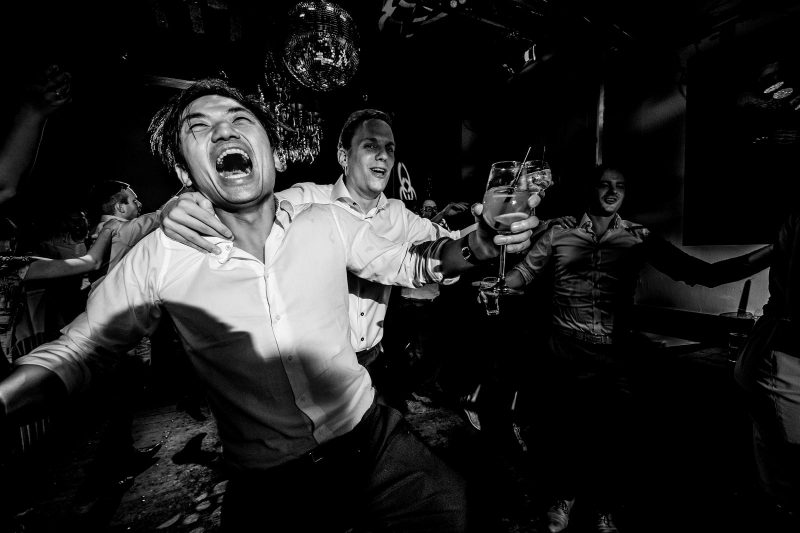
Peter Geluk:
He’s happy with that. Yeah, he’s fine because he does weddings on his own as well still, which is fine. And he does them a little bit differently and that’s fine. But when he’s working with us, then we don’t have disagreements, he doesn’t set up any huge lights and no big tripods and everything for some steady cam. I don’t know. Yeah. I want to see nothing. I just want to handle with the camera in his hand and that’s it. And that’s fine. It really works out well.
Alan Law:
Oh, that’s cool. That’s really cool. Okay, let’s change tack again slightly as well. What’s something that you really love but that most people seem to hate?
Peter Geluk:
In wedding photography?
Alan Law:
No, no, no. It can be if you want, but just anything.
Peter Geluk:
Something I love what other people seem to hate. That’s a broad question, man.
Alan Law:
I know. That’s why I like these, man. I like them.
Peter Geluk:
I know. I imagine you do. You can hear a squirm.
Alan Law:
Or you could flip it around. Something that you hate that people seem to love.
Peter Geluk:
It’s easier, I suppose.
Alan Law:
Is it? Yeah. Okay. Right.
Peter Geluk:
I don’t particularly love going to the beach.
Alan Law:
Really? Oh, that is unusual. Why not? Why not?
Peter Geluk:
I don’t know. It’s sand between your toes and everything. I just don’t like it and I don’t like swimming in the sea and it’s not my thing. I don’t hate it, but it’s ironic because we have a beach 50 meters from our house.
Alan Law:
50 meters really?
Peter Geluk:
Yeah. It’s like down the streets over the dyke. I don’t know if you could say dyke. That’s what’s it called. That stops water from coming into our houses. So you go over there and then there’s the beach. It’s really, really close. So we go there, but I try to stay out of the wave. It’s weird. It doesn’t make any sense.
Alan Law:
It’s a bit unusual, but that’s cool. That’s what makes you you. But that’s awesome to live so near to the beach. I’d love that.
Peter Geluk:
Yeah. Yeah. And that’s, I know, we’re weird people a little bit, right? Like I said before, so we lived in this big house and paid a lot of money on the mortgage and then at some point, couple years ago we decided that didn’t make any sense. We didn’t want to do it. So we sold the house and we bought a really, really small house back. So we’ve a lot less space now.
Alan Law:
Ah, but that’s cool.
Peter Geluk:
But it’s 50 meters from the beach and even though I don’t like the beach, I like walking along it just by myself and you know, listening to the birds.
Alan Law:
Was there a specific reason why you did that downsizing then?
Peter Geluk:
Yeah, there was, because at some point we were talking about this and we figured, okay, do we want to keep working just to pay the mortgage for this ridiculous house or do we want to live? And then we decided we want to live and enjoy ourselves and enjoy time with our kids.
Alan Law:
That’s so cool. I think that’s really inspirational, man. I really do. I think that’s awesome.
Peter Geluk:
Yeah and I’ve heard that from other people since we’ve never been secretive about this. We told everybody, look, this is what we’re doing. It’s a weird move. I know not many people do this, but we’re downsizing and we love it and we’re going a little bit more minimalistic. We gave away a lot of stuff, we sold a lot of stuff, we threw away a lot of stuff and it’s simplifying again, man. I can really recommend it to everybody. Not living in a smaller house, that’s not for everybody, but it works really well for us actually.
Alan Law:
That’s great man. I think that’s so cool that you’ve just got your priorities. You know what makes you happy. Cause so many people are in this rat race of just material after material objects, bigger and bigger house, more and more money. But that’s not what life’s about.
Peter Geluk:
I don’t think it is. And it’s fine if you want that, you know, keep going for it, if that makes you happy, please by all means. But it didn’t make us happy. It just weighed on us. Right? That mortgage, that big amount of money that you had to get out there every month and give to the bank and it made no sense. Right? So we decided we had to stop doing that. Well, the only way to do that is sell and buy something that’s cheaper and cheaper usually means smaller. So
Alan Law:
Yeah, that’s true. But near the beach though, which is nice even though you never liked the beach.
Peter Geluk:
Even though don’t like the beach. I like being beach adjacent.
Alan Law:
What annoys you in life, Pete?
Peter Geluk:
What annoys me? Dishonesty mostly I suppose. Dishonesty and injustice really, really, and it has been since I was a kid.
Alan Law:
Oh really?
Peter Geluk:
Yeah. It really winds me up so I can’t…
Alan Law:
Were you kind of like standing up for people at school and things?
Peter Geluk:
Ah, no man, I wasn’t. I didn’t necessarily have the balls to do that. I wish I did. I’m a fairly small guy so I was always the smallest in my class and so I was sort of a protestor in my own bedroom or something like that. Oh I hate when people do that. So Yeah.
Alan Law:
Yeah. But I understand those annoyances. What were you generally like at school then? Were you kind of creative as a kid? I guess you didn’t dream of being a wedding photographer?
Peter Geluk:
No, not at all. I didn’t even dream of being anything creative. So the way I was living, a little bit of a backstory, if that’s okay.
Alan Law:
Yeah, of course. Yeah. Stories are good.
Peter Geluk:
Yeah. So I was raised in a very small village, actually the village I’m again living in now, as luck would have it. And it’s a very religious village and I was raised very, very religiously and I’m talking I’m talking no TV, no radio, yes, yes. Sundays, two times to church and not going out and stuff like that.
Alan Law:
Right. Wow, no TV at all as a child?
Peter Geluk:
Nothing. Nothing. Well, I did watch TV at friends obviously do as much, as much as possible. I was addicted to Zoro, but yeah, so no TV at home. So that’s tricky. Right? That’s a weird way of growing up in these times as well. Yeah. I completely forgot what I was going with.
Alan Law:
Oh talk about how you were at school and whether you were creative.
Peter Geluk:
Yeah. So I grew up in a bit of a conservative environment and the schools I went to were the same especially the one I went to, the high school was very conservative and they didn’t do anything with creativity so I didn’t know I was creative. I was doing creative things, but I thought those everybody did those. I didn’t know. I was drawing and I was I was always interested in photography but didn’t have a chance of doing it, but I was mainly, I was doing these mix tapes with my brother.
Alan Law:
Okay. What kind of mix-tapes?
Peter Geluk:
We were playing radio basically. So we had a pickup from my dad and some church music that we that we put up. And then we connected the tape recorder to it and spoken to the microphone of that and then played music and then spoke. So that’s what we did.
Alan Law:
Okay, cool.
Peter Geluk:
Yeah, so we played radio, so that’s creative things and then we did we did plays in them. So we thought of a story and then played it out and recorded that, all those tapes are lost, which is such a shame.
Alan Law:
Oh, that is a shame.
Peter Geluk:
I know. It’s horrible. And I mean probably most of them were taped over during my teenage years with crappy music. But yeah, that’s what happens, right? But there was a lot of creativity going on. Right? Music at some point started, you know, playing the organ and later piano and guitar.
Alan Law:
Oh, cool. Cool. Do you still play those?
Peter Geluk:
Yes, I play guitar and bass.
Alan Law:
That’s nice. Yeah. Cool. Have you played in a band or anything?
Peter Geluk:
I have played in many bands, but not at the moment. So sort of taking back seat. I’ve started doing acting now.
Alan Law:
Oh really? Oh wow.
Peter Geluk:
Because I thought that will be nice. So I tried.
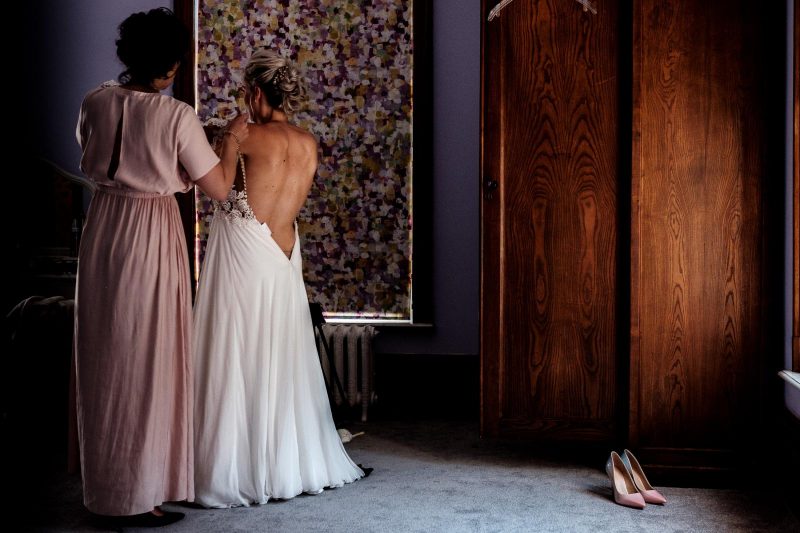
Alan Law:
Well, you are very creative then. Photography, Music, acting, that’s awesome.
Peter Geluk:
Well, I’m not sure if I’m any good at acting, you know, time will tell and it’s fun to do.
Alan Law:
Okay. So are you doing it kind of regularly at the moment? I guess you’re not acting at the moment then, but no.
Peter Geluk:
Nothing’s happening.
Alan Law:
Is it kind of like plays in your area though before this was happening?
Peter Geluk:
Yeah. And stuff like that and some improv.
Alan Law:
Oh man. Cool. That’s cool. You don’t get nervous about that either then.
Peter Geluk:
Yes I do, but I’m better at improv than at plays because I’m crap at remembering lines. So I’m a lot better at the improv things, you know.
Alan Law:
Yeah. Cool. Sorry, I’ve taken you totally off. I’ve taken you different tangents.
Peter Geluk:
No, that’s fine. I love that. But yeah, so all the creative stuff was going on and nobody really recognized it in me. And that’s also because, like I said, I was very introverted and shy back then and I think nobody really noticed me and that was fine. It wasn’t something that was hurtful to me or anything. It was fine. I was just plodding along and that was fine, but I didn’t realize the creativity in me either. And if I would have, I probably would’ve started doing something creative a lot earlier and I would have probably gone to an art school or something, which I didn’t.
Alan Law:
But then you never know, you know, if you’d gone to an art school, it might have taken the love of it away from you and then you might have not ever done something creative. You just never know. Do you, I guess?
Peter Geluk:
That’s true actually. Yeah, I haven’t looked at it that way.
Alan Law:
I guess so then if you’ve been doing this 10 years, you started doing wedding photography when you were about 28, then, is that right?
Peter Geluk:
Yeah.
Alan Law:
Yeah, that’s still quite. How old am I? Oh yeah, no, I’m not going to say on podcast. I won’t do that. No. Okay. No I’m 39 and I’ve been doing this. I started in late 2012. So yeah, I started like, I was about 31 or 32. So I wish I’d started earlier. So 28 though. That’s cool. That’s quite young to start.
Peter Geluk:
Yeah, it is. It is Okay. Actually. And it was a wild ride before then of working in companies and things I didn’t like. And the last company I worked for, I was, like I said, a graphic designer mostly. Yeah. They called it the creative manager.
Alan Law:
Sounds cool.
Peter Geluk:
It sounds amazing.
Alan Law:
That’s such a good skill to have when you’re starting your own business as well.
Peter Geluk:
Yes, it is. And I still love it and I still do it. I do it for myself and sometimes it for others and I love doing it because yeah, sort of a different outlet from time to time, you know.
Alan Law:
That’s cool. It’s important to have that. Yeah. Yeah, definitely. Oh man. Cool Pete. Honestly, this has gone, I’ve just checked the time. It’s gone so quickly. I thought it’s just flown by. I think we’ve got time for just one more question. So it’s going to be a nice little throwaway question, but yeah what in your opinion makes a good wedding photographer?
Peter Geluk:
Ah.
Alan Law:
The big one, isn’t it? It’s a big one.
Peter Geluk:
Yeah. It’s a big one but I think it’s… Do you know what? I think is it possible to generalize even all the wedding photographers being a good wedding photographer? I mean there’s so many different ways about going about this and even my way and our way of shooting weddings is changing as we go along. So we become different wedding photographers; a little bit different every year I suppose. But what it does take, is people skills and that’s something you can learn because I’m the living and breathing example of that because I didn’t have them. And wedding photography has taught me that. So yeah. Great people skills really make you a better wedding photographer in my opinion.
Alan Law:
Right. Yeah. And I love the way how you have, yeah. As you say, you’ve had that experience and that wasn’t your forte. And then just by doing it more and more though, you got so much better at that.
Peter Geluk:
Yeah. And that goes for many things in life, right? So I always tell people around me, look, if I don’t know how to do something, just pick me up, throw me in the deep end when I can’t swim and I’ll learn. I learned on the job because that’s for me, the best way of doing it for me. I’m learning stuff for me and that’s what I’ve done with wedding photography as well. Yeah.
Alan Law:
I totally get that. I think that’s great. Cool. I think that’s great advice man. That’s awesome. Oh man. Thank you Pete, sorry that flew by. Thank you so much for that, for your time and then your honesty. I thought that was really, really interesting. Anyone who’s listening whilst editing, I know I keep saying this, there’s no weddings at the moment but you know, people might be listening to this in eight months’ time as well so you never know what people are going to be doing, but yeah head to the site, thisisreportage.com and there’ll be a full transcript of this, lots of examples of Pete’s work and links to his website as well. And yeah, hopefully I’ll get to meet you in the flesh one day man.
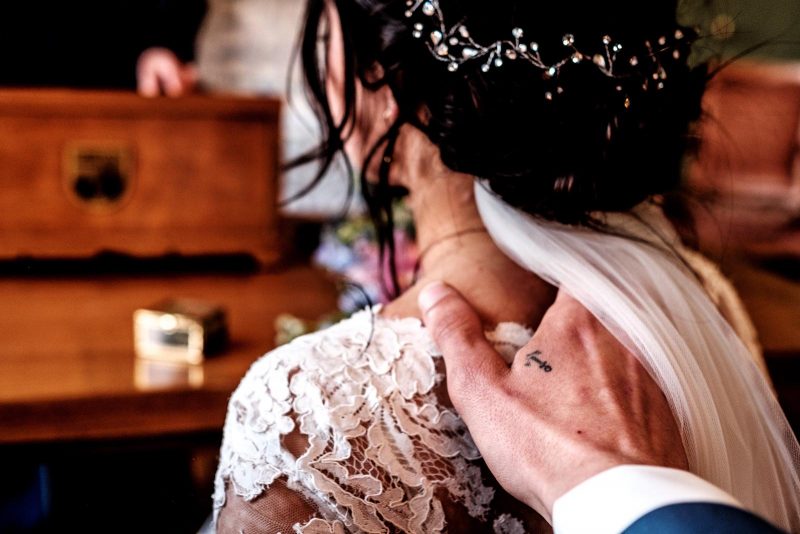
Peter Geluk:
I would love that. I would love that. And before we sign off, can I just say how cool it is that you started this whole This is Reportage movement because there wasn’t something like this and then when you started, I think I was one of the fairly early adopters of it.
Alan Law:
Thank you man.
Peter Geluk:
Yeah. It’s really valuable and the way you’re doing the podcasts and now the Facebook Lives, you know, you’re looking for new stuff. I applaud you for that.
Alan Law:
Thank you so much. I really appreciate that. And it’s awesome to have you part of it. You and Mitzy, you’re both so great and it’s lovely to spin out to chat to you properly. It’s so nice. As soon as it’s possible. And obviously you’re always welcome to come down here and stay with us in Cornwall.
Peter Geluk:
Thanks I might take you up on that.
Alan Law:
Dude, honestly. Definitely. The sun’s shining now as well. I can’t guarantee that when you come, but it is now.
Peter Geluk:
Sounds nice, man.
Alan Law:
Awesome. Well, you both stay safe and yeah, and I hope to meet you at some point.
Peter Geluk:
Alright.
Alan Law:
Bye dude.
Peter Geluk:
Bye bye.
***********************************************************
Peter was great, hope you enjoyed listening/reading!
View more of his work on his website, his TiR profile, and the full ‘This is How’ piece which we talk about in the podcast.
The deadline for our next round of Awards is really soon: Submit by 23:59 BST on 24th May 2020. Members receive an unlimited number of images on their profiles, 60 Reportage & 18 Story Award entries per year, and much more. See all the details and join us here.
